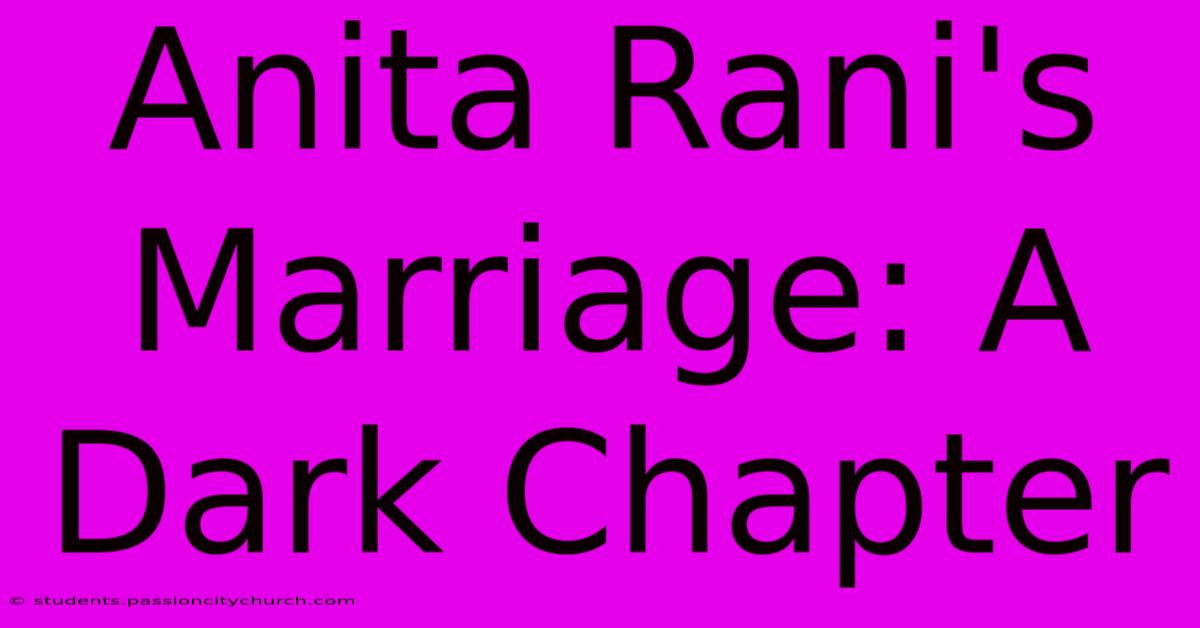Anita Rani's Marriage: A Dark Chapter

Discover more detailed and exciting information on our website. Click the link below to start your adventure: Visit Best Website. Don't miss out!
Table of Contents
Anita Rani's Marriage: A Dark Chapter? Exploring the Public and Private Narrative
Anita Rani, the celebrated British broadcaster and journalist, enjoys a prominent position in the media landscape. While her professional life is often under the spotlight, her personal life, particularly her marriage, remains largely shielded from public scrutiny. This carefully guarded privacy, however, has fueled speculation and, in some circles, the narrative of a "dark chapter." This article delves into the available information, exploring the public perception of Anita Rani's marriage and the importance of respecting the boundaries of private life within the context of public personas.
It's crucial to preface this discussion by stating unequivocally that there is no publicly available evidence suggesting a "dark chapter" in Anita Rani's marriage. Any claims to the contrary are based on conjecture and should be treated with extreme caution. The absence of information is not evidence of negativity; it highlights the successful preservation of a private life in the face of intense public interest.
The Public Persona vs. Private Life
Anita Rani is known for her warmth, intelligence, and articulate presentation style. She commands respect for her professional achievements, her advocacy work, and her ability to connect with audiences across various platforms. This positive public image, built over years of dedicated work, naturally leads to a certain expectation of happiness and fulfillment in her personal life. However, it's vital to remember that the carefully curated persona we see on television and in interviews is only one facet of a complex individual. Equating public success with private bliss is a dangerous fallacy.
The Challenges of Fame and Privacy
Living a life in the public eye comes with significant challenges. Celebrities constantly face intense scrutiny, often having their personal relationships dissected and judged by the media and public alike. This can lead to immense pressure, particularly when individuals prioritize privacy and wish to shield their personal lives from unwarranted intrusion. Anita Rani’s careful management of her private life, therefore, should be seen as a testament to her strength and commitment to maintaining boundaries.
The Power of Speculation and the Media Landscape
The media often thrives on speculation and rumour. The absence of detailed information about Anita Rani's marriage can easily be filled with conjecture, leading to the creation of narratives that are entirely unsupported by facts. This phenomenon is amplified by social media, where speculation and unsubstantiated claims can spread rapidly and gain considerable traction. It's essential to critically evaluate the sources of information and avoid perpetuating unsubstantiated narratives.
The Importance of Respecting Privacy
Ultimately, the details of Anita Rani's marriage are her own. Whether her relationship is characterized by joy, challenge, or anything in between is entirely her business. We, as consumers of media and public figures, have a responsibility to respect her right to privacy and avoid engaging in speculation or assumptions based on limited or non-existent information.
Analyzing the "Dark Chapter" Narrative
The very notion of a "dark chapter" in Anita Rani's marriage is, as previously stated, unsubstantiated. The term itself suggests negativity and unhappiness, projecting assumptions onto a private relationship based on no concrete evidence. This highlights the dangers of sensationalism and the importance of responsible reporting.
Lessons in Responsible Media Consumption
This situation serves as a potent reminder of the need for responsible media consumption. Before accepting information as fact, it is crucial to critically analyze the source, identify potential biases, and verify the information with credible, independent sources. Spreading rumors and engaging in speculation can be damaging to individuals and contribute to a toxic online environment.
The Value of Boundaries and Self-Care
Anita Rani’s decision to keep her personal life private should be applauded. Setting and maintaining boundaries is crucial for self-care and emotional well-being, especially for those in the public eye. Her actions should serve as a reminder that public figures are entitled to privacy and should not be expected to constantly share intimate details of their lives.
Conclusion: Embracing Privacy and Responsible Reporting
There is no evidence to support the narrative of a “dark chapter” in Anita Rani's marriage. This lack of information, however, should not be interpreted as evidence of unhappiness. Rather, it should be recognized as a conscious choice to protect her privacy. The media and the public alike have a responsibility to respect this privacy and avoid perpetuating speculative narratives based on conjecture. This is not merely a matter of courtesy; it is a fundamental respect for individual autonomy and the right to a private life, even for those in the public eye. Let us focus instead on appreciating Anita Rani's professional accomplishments and contributions, recognizing her right to maintain a private and personal sphere separate from her public persona. Her example underscores the importance of advocating for privacy and engaging in responsible media consumption.

Thank you for visiting our website wich cover about Anita Rani's Marriage: A Dark Chapter. We hope the information provided has been useful to you. Feel free to contact us if you have any questions or need further assistance. See you next time and dont miss to bookmark.
Also read the following articles
| Article Title | Date |
|---|---|
| Silvester 2024 Deutschland Feuerwerk | Dec 28, 2024 |
| Leigh Revers Poilievres Higher Ed Challenge | Dec 28, 2024 |
| Coach Larranaga Steps Down At Miami | Dec 28, 2024 |
| Dua Lipa Callum Turner Relationship History | Dec 28, 2024 |
| Polska Traci Pawla Grzybczyka Kaskadera | Dec 28, 2024 |
| Rekordnyeremeny 800 Millio A Skandinav Lotton | Dec 28, 2024 |
| Zeffirellis Juliet Olivia Husseys Film | Dec 28, 2024 |
| Warriors Vs Clippers Lesionados E Escalacoes | Dec 28, 2024 |
| Liga 1 Malut United Tantang Persija | Dec 28, 2024 |
| Brighton Seri Lawan Brentford | Dec 28, 2024 |
